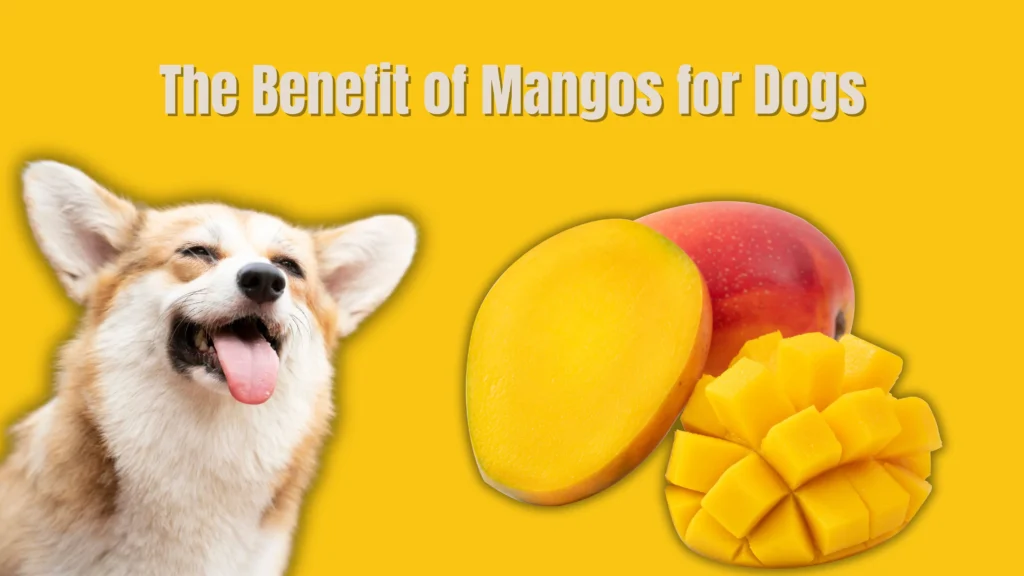Can Dogs Eat Mango?
Many dog owners wonder if it’s safe to share their mangoes with their furry friends. The good news is that dogs can indeed eat mango, as long as certain precautions are taken. This tropical fruit is not only delicious but also packed with essential nutrients. Can Dogs Eat Mango? However, due to its high sugar content, mango should only be offered to dogs in small portions and as an occasional treat. Always ensure the fruit is peeled and the pit is removed to prevent any choking hazards or digestive issues.
Mango’s soft and juicy flesh makes it a treat that many dogs enjoy, which is why it can be tempting to share this sweet snack with them. While the fruit provides health benefits, including vitamins and hydration, it’s important to be mindful of portion sizes. Dr. Brittany Caramico emphasizes the importance of feeding mango safely to dogs, highlighting that not all parts of the mango are safe for canine consumption. By following these guidelines, you can safely indulge your pet with this flavorful fruit while ensuring their health and well-being.
Is Mango Good for Dogs?
Mango is a delightful treat for dogs, packed with essential nutrients like vitamins A, B6, C, and E, as well as dietary fiber and antioxidants. These nutrients contribute to overall health by supporting good eyesight, skin health, and immune function. Additionally, the protein content in mango aids in muscle repair and tissue health, while potassium enhances nerve and muscle function. However, it’s important to offer mango in moderation, as its high sugar content can lead to dental issues and digestive upset if consumed in large amounts.
When serving mango to your dog, always ensure it is ripe and cut into small, manageable pieces to prevent choking. While this fruit can be a tasty and nutritious snack, it should not replace a balanced diet, as dogs primarily obtain their vitamins from regular meals. Keep in mind that not all dogs may tolerate mango well, especially those with sensitivities to fiber or those with diabetes. Therefore, it’s best to introduce mango gradually and observe how your pet reacts to this sweet addition to their treat repertoire.

Can Mango Be Bad for Dogs?
Mangoes are safe for dogs in moderation, but they come with a few important caveats. Their high carbohydrate and sugar content means that excessive consumption can lead to health issues such as obesity, diabetes, and dental problems. For dogs already dealing with these conditions, mangoes are best avoided. It’s crucial to consult your veterinarian to determine suitable dietary options for your pet’s specific health needs.
While mango offers several nutritional benefits, it can pose risks in certain situations. Dogs with medical issues like pancreatitis or diabetes need to adhere to strict dietary guidelines, making mango a potentially unsuitable choice for them. Additionally, the skin of the mango contains urushiol, which can irritate a dog’s skin and may cause allergic reactions. The skin can also be hard to digest, leading to gastrointestinal discomfort. Furthermore, the mango pit is a serious choking hazard and can result in dangerous intestinal blockages if ingested. Always ensure that mango is prepared safely for your dog.
Can Dogs Eat Dried Mango?
Dehydrating fruit at home can make dried mango a safe option for dogs, but it’s important to give smaller portions since the sugar content becomes more concentrated during the drying process. Fresh mango is generally a better choice for dogs due to its lower sugar levels and higher nutritional benefits.
On the other hand, store-bought dried mango is not recommended for dogs. It often contains added preservatives and sugars that can be harmful. Additionally, dried mango is high in calories and carbohydrates, which can lead to stomach upset and contribute to dental issues if fed in excess. While a small amount of dried mango is unlikely to cause harm, fresh mango is the preferred option for keeping your dog healthy and happy.

The Benefit of Mangos for Dogs
Mangoes are a nutritious fruit for both humans and dogs, packed with essential vitamins and minerals. They are rich in fiber and contain vitamins A, B6, C, and E, which play crucial roles in promoting overall health. These nutrients support vital functions such as immune system strength, eye health, and skin maintenance. Moreover, the fruit is a source of antioxidants, particularly beta-carotene, which helps combat free radicals and may protect against certain degenerative diseases and skin issues.
While mangoes can be a delightful treat due to their sweetness and appealing texture, they should be offered in moderation. Although dogs can benefit from the vitamins found in mango, they typically obtain these nutrients from a balanced diet. Therefore, consider mango as an occasional snack rather than a primary source of nutrition. When serving mango to your dog, it’s important to cut it into small pieces to prevent choking, especially since the fruit is soft when ripe.
Additionally, mangoes may assist in digestive health; small amounts can help alleviate symptoms like diarrhea and constipation. The presence of potassium and protein supports muscle repair and enhances nerve function. Overall, mangoes can be a fun and tasty way to give your furry friend a little extra boost in vitamins while ensuring they enjoy a variety of flavors in their diet.







